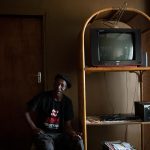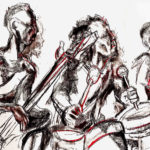The Malopoets: ‘My way or the highway’ in Europe
When the Malopoets were invited to play in Europe, the band thought they were leaving behind the rules and restrictions of arbitrary authorities. The reality proved different.
Author:
13 February 2019

Malopoets co-founder Pat Sefolosha and his wife Christine, now based in Switzerland, arranged with French producer Martin Meissonnier for the band to play some European shows. After a frustrating wait for visas, they arrived in 1983. But for Meissonnier, the Malopoets were, if anything, too close to their roots.
“He said,” recalls bassist Patrick Mokoka, “if we wanted shows, we had to sit and change the music. We tried, for two months, trying to put in some Western influences. He said we needed a pianist, which wasn’t our sound, but…”
The first pianist the band approached didn’t work out. “But there was this other South African in Paris, a really good player. Maybe you’ve heard of him? Chris McGregor. And that was who the Malopoets played their first French show with,” says Mokoka.
Related article:
Eventually, Mokoka recommended not another pianist, but South African guitarist Kenny Mathaba, experienced in jazz and popular music, who had often played a rhythm guitar role at Orlando’s legendary Pelican Club for bands who lacked a pianist.
When he arrived, in late 1983, Mathaba, too, felt the pressure to change the music. “[Meissonier] didn’t like the Malopoets’ progressive music and wanted us to pay attention to popular stars: Babsy Mlangeni, the Soul Brothers, Steve Kekana. He gave us an ultimatum: either you follow my direction or you go back home. It was a bit disturbing. And while that was going on, the band was facing many personal challenges, too, asking themselves not only what’s our voice, but why are we here, what do we want to tell the world and do we want to risk having to stay in exile?”
For guitarist Sam Tshabalala, that question answered itself after the killing of Ben Langa in 1984. Former comrades murdered Langa after the regime planted false rumours that he was a traitor. Says Tshabalala: “We were not just another music band. Our lyrics spoke about the situation … By 1984, it was too problematic to continue living in South Africa. Ben Langa, who wrote poems for the band, was assassinated … Eugene Skeef and Ben Langa had inspired me and I learned so much from them … [Then] I also chose the path of exile.”
Related article:
Mathaba stayed with the band through their second published album (and international debut), the Paris-recorded Malopoets, managing the transition into the band of exiled Cape Town pianist Mervyn Afrika. Mahlobo later reflected that introducing an electric keyboard meant “the sense of South African roots was alienated … they killed the sound”.
In 1985, after making a video of the album’s anthemic track, Sound of the People, the Malopoets toured Europe and the United States. After meeting Bruce Springsteen’s guitarist, Steven van Zandt, they participated in the project he helmed, the Artists Against Apartheid recording (Aint’t Gonna Play) Sun City.

Mathaba, in his time back home, had been responsible in South Africa for Ozila’s monster hit Life Saver (I’m Suffering), which also featured Mokoka on bass: an indication of the slowly widening space for coded lyrics of resistance back home, as apartheid’s grip began to slip. “But I also thought,” he says, “if anything happens because of this song, I’ll be out on tour again by then.” In October 1985, at the end of their tour, the Malopoets disbanded.
Paris Afropop and London jazz
Mathaba remembers long and anguished discussions about whether to stay in Switzerland or France, or return home. He sees the eventual decision of some band members to stay in France as positive, “a real musical learning experience”. Interacting with musicians from Fela Kuti’s bands, the Bourkinabe outfit Farafina, Salif Keita (“He was just a young hopeful then”) and more, “things were better for all of us. You had real audiences who’d actually pay for a ticket to hear music!” After Ozila’s success, though, he had a platform back in South Africa, to which he and Mokoka returned.
Mahlobo stayed longer, eventually landing up in London, where he found a similarly diverse scene – but one far more influenced by jazz than Afropop.
He gigged intermittently with saxophonist Julian Arguelles and his brother, drummer Steve Arguelles, who were associated with innovative jazz outfit Loose Tubes.
Julian Arguelles remembers the times: “There were many young musicians who were hugely influenced by their experience working with South African musicians. I was working with Chris McGregor and my brother with Dudu [Pukwana’s] band. There was a great mixture of different forms of jazz around.”
Related article:
He was impressed by Mahlobo’s unique musical vision: “Duze’s music was special, beautiful tunes and … I had never heard a guitar player like him before or since.” But Mahlobo returned to South Africa in 1989.
Mokoka returned to Europe to work with Mathaba, Sosibo and Tshabalala on 1989 promotional shows for the Brussels-recorded album Life is for Living. Virgin Records originally intended it as Sefolosha’s solo debut, but then decided the Malopoets must reunite.
“The record company made it Pat Sefolosha’s album, with the other musicians just ‘support’,” says Mokoka. “Because of that, the spirit, the communication couldn’t be the same as it was, because of this thing of being ‘the bandleader’ … We had sacrificed our lives and stayed away from our families to be with this band back then … It was very sad, the way it ended.”

But though that was the last time the musicians appeared on stage together, it hadn’t quite ended, and still has not. Sadly, Bruce Sosibo died in South Africa in 1995. Earlier, he had formed the band Zanusi. That, ironically, broke up over precisely the same tensions as the Malopoets: the title and place of a leader in collaborative music, and demands to commercialise performance and presentation.
Careers continue – and the lost album resurfaces
Thirty years on, Sefolosha and Christine now live in the US, where their second son, Thabo, is a National Basketball Association (NBA) star. Mahlobo is in Durban and still sometimes performs with his brother, Wakhe. Mokoka still plays bass – with Don Laka, Vusi Mahlasela and Eldorado Park band, Fifth Connection.
Skeef lives in the United Kingdom, where he is a fellow of the Royal Society of Arts, a performer, teacher, and cultural activist and organiser. Mathaba remains a performer and producer, and is serving his second term on the Gauteng Arts and Culture Council, of which he was formerly chair.
Tshabalala works in Paris, where his most recent album, Back and Forth, has closed the circle by featuring old-time Ongoye collaborator Kaya Mahlangu and a reworking of an early Staffrider poem by Skeef.

And what of those master copies of Rebirth that disappeared without trace? Mokoka says, wistfully, “I still believe we might hear one of those songs one day.” And recently, specialist collectors’ label Matsuli Music has tracked down what may be the only surviving copy of the masters. The company is working out the best way to negotiate publication rights. So, yes, one day…
Part one:
Note: It takes a village to put together a story like this. As well as the generosity of my interviewees – Julian Arguelles, Pat Mokoka, Kenny Mathaba and Eugene Skeef – I’d like to acknowledge Nicky Blumenfeld, who shared her Paris tapes of interviews with Sam Tshabalala, as well as scholar Dr Sazi Dlamini at UKZN, whose 1998 Master’s thesis on neo-traditional music provided invaluable interviews and insight.
PLAYLIST
– Malopoets, 1985- Sound of the People
– Life is for Living, 1988/9 (setting of speech by Rev. Allan Boesak) – The End is Near
– Sun City, 1985 by Artists United Against Apartheid – Let Me See Your ID
– Ozila, 1987 – I’m Suffering




